With the year’s biggest watch launch event, Watches & Wonders 2022, set to kick off in Geneva at the end of this month and virtually guaranteed to command the attention of the watch media community over its weeklong run, one major luxury watchmaker that won’t be at the mega-event in Switzerland hosted its own event in Miami earlier this week. Omega Days 2022 wrapped up and Teddy and I were on site to cover the new releases. Here’s a rundown of the new Omega watches launched in Sunny Florida this week (all photos are Teddy's own).
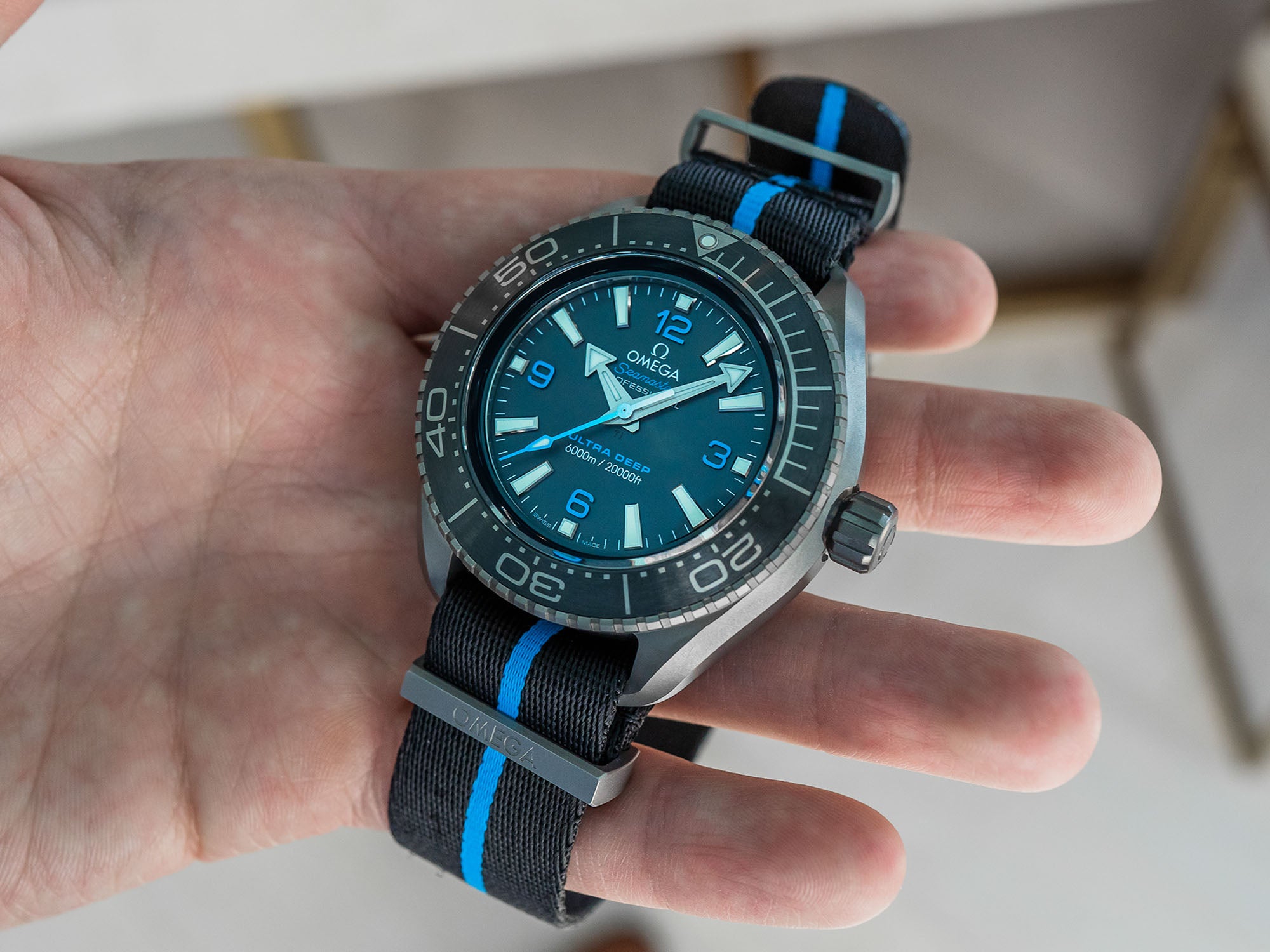
FROM PROTOTYPE TO PILLAR: SEAMASTER PLANET OCEAN ULTRA-DEEP
Omega made history (and scored a win in its ongoing battle with rival Rolex for dive-watch record supremacy) in 2019 when the prototype watch it created, called the Seamaster Planet Ocean Ultra Deep, descended more than 10,928 meters (or 35,853 feet) into the Marianas Trench on an undersea expedition headed by ocean explorer Victor Vescovo. That feat bested the previous record of 35,787 feet, set in 2012 by the Rolex Deepsea model that accompanied director James Cameron in his Challenger Deep expedition, and thus bestowed upon Omega the badge of maker of the world’s most water-resistant watch. The prototype, made of titanium and measuring a hulking 55 mm in diameter and 28 mm thick, was not really made to be wearable as a wristwatch, and it was unclear at the time whether the Ultra Deep model would ever be incorporated into the regular Omega lineup. Somewhat surprisingly, Omega has answered that question in the affirmative just three years later.
The clear flagship launch for Omega thus far in 2022, the new Planet Ocean Ultra Deep collection is comprised of seven watches — one in a case of grade 5 titanium like the prototype, and six additional in a newly developed alloy called O-megasteel. As one would expect, the cases have been downsized for easier wrist wear — still large, at 45.5 mm and still thick, at 18.2 mm, but more wrist-friendly than its titanic (no pun intended) predecessor. The watch’s water-resistance is a very robust 6,000 meters, though Omega says each watch has actually been tested to 7,500 meters — again, not as punishing a level of pressure as the more than 10,000 meters the prototype endured on its voyage with Vescovo that secured Omega its dive-watch bragging rights, but certainly at the upper echelon of underwater toughness for a watch; the Rolex Deepsea tops out at a rating of 3,900 meters.
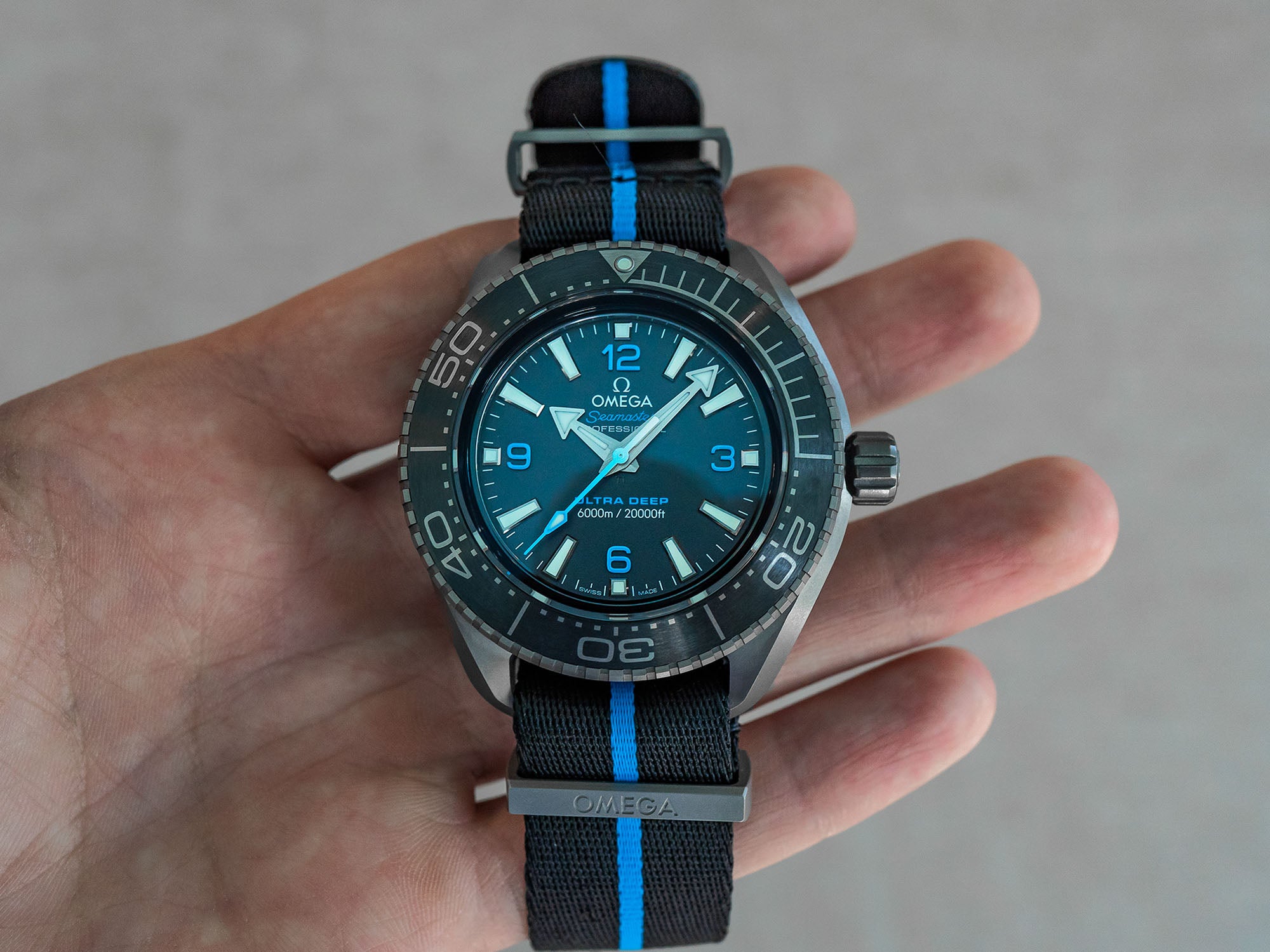
The titanium model is entirely satin-finished to avoid glare underwater and like its non-commercial predecessor, it has the distinctive openworked “Manta lugs” to lighten its overall load and connect it to a sturdy NATO strap — in this new iteration, made of polyamide yarn sourced from 100 percent recycled fishing nets, a nod to ocean conservation. Its rotating bezel is made of the same black titanium as the casebody, with a black ceramic dive-scale insert. Ceramized titanium is used for the dial, whose hands and markers are coated with blue-emission white Super-LumiNova.
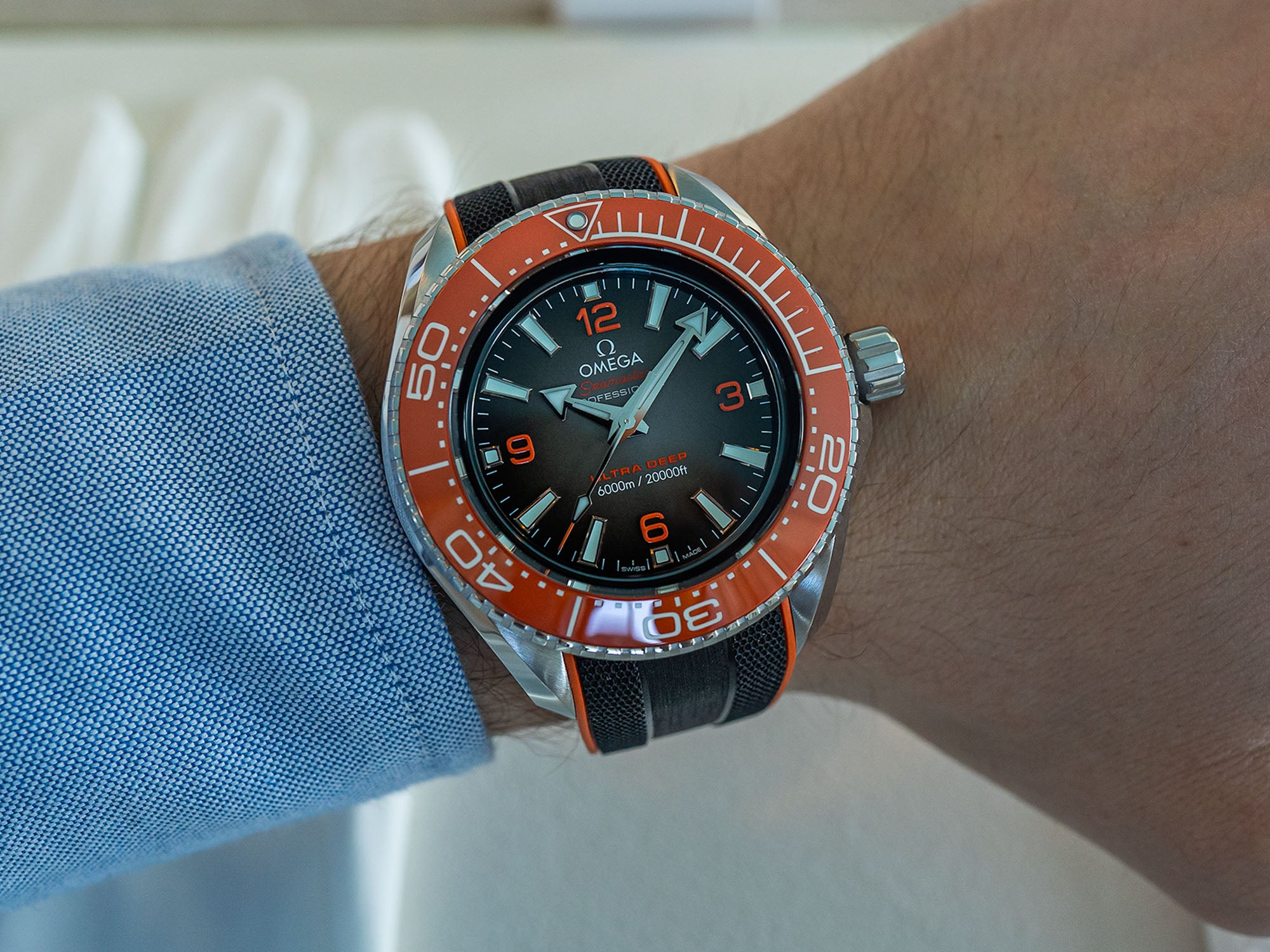
Joining the titanium watch are the half-dozen Ultra Deep models with cases made of O-megasteel, a new alloy developed by Omega that has been engineered for not only optimum strength and hardness but also elasticity. In contrast to the 316L and 904L grades of steel used widely throughout watchmaking, O-Megasteel uses only a smattering of nickel (0.5 percent) in the mixture, making it uncommonly hypo-allergenic, as well as corrosion resistant and impressively shiny. (It is, however, not nearly as lightweight as titanium.) The O-Megasteel watches all feature ceramic dive-scale bezels in a variety of bright colors and either white or gradient effect dials (the latter in either gray-to-black or blue-to-black). The hands and indices are white-gold, and the sapphire crystals are doomed and beveled to resist maximum underwater pressure. The watches are mounted on either a rubber strap with what Omega terms a “technical dive suit structure” or an O-Megasteel bracelet, outfitted with Omega’s patented extendable foldover clasp and diver’s extension mechanism.
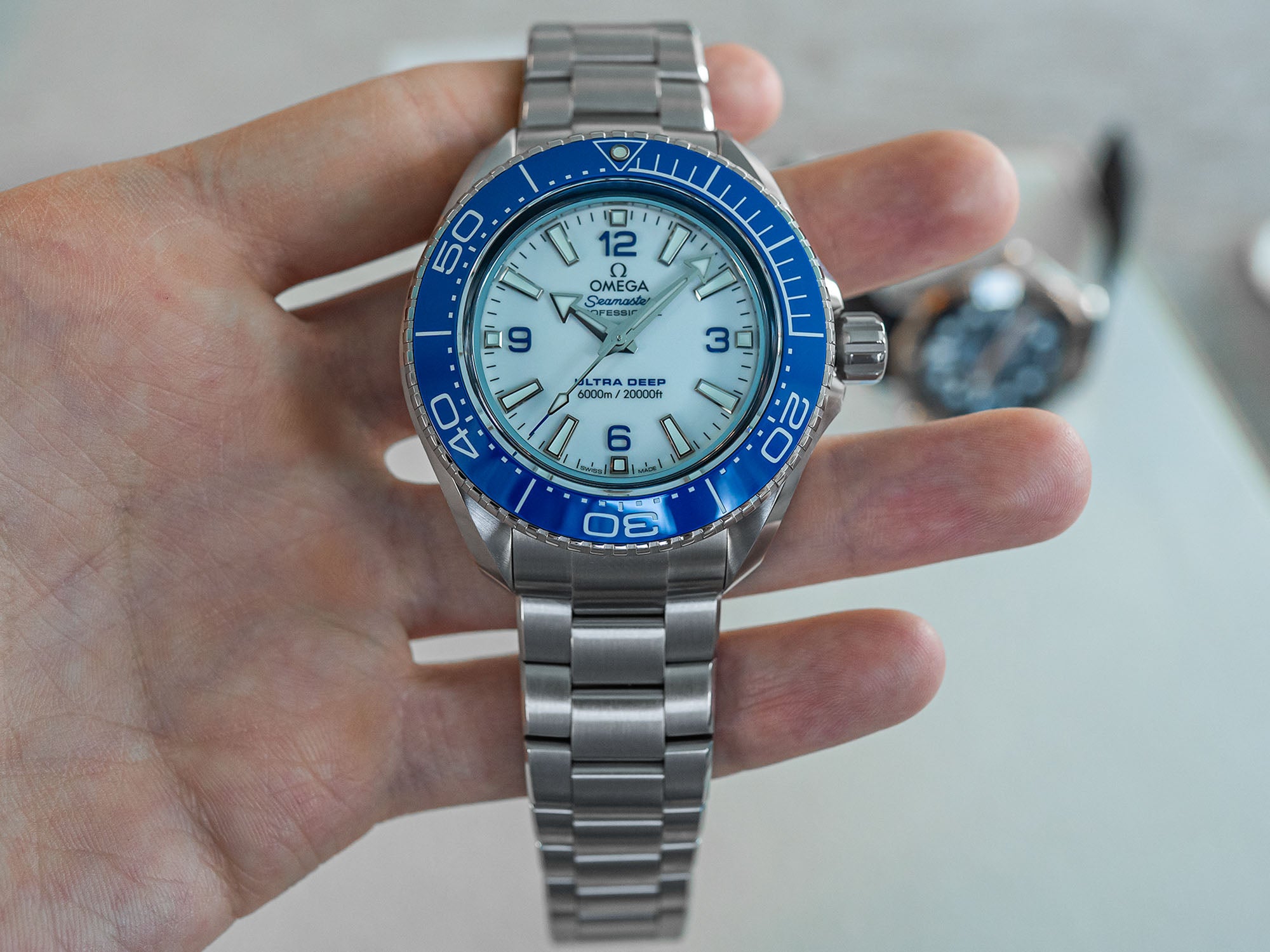
Ensconced inside all the Planet Ocean Ultra Deep watches, behind titanium casebacks graced with a laser-engraved Sonar emblem, is Omega’s Master Chronometer Caliber 8912, with its hallmark co-axial escapement, METAS-certified chronometer accuracy and antimagnetic resistance (up to 15,000 gauss) and offering a power reserve of 60 hours. The self-winding movement’s top-notch decorative elements, including blackened screws and balance wheel, Geneva wave pattern in Arabesque on the bridges, and rhodium plating on the rotor, are hidden behind the wave-edged solid caseback, which attests to Omega’s attention to detail even when such detail work isn’t readily evident. Prices: $11,200 on straps and $11,600 on bracelets for the O-megasteel models and $12,300 for the titanium.
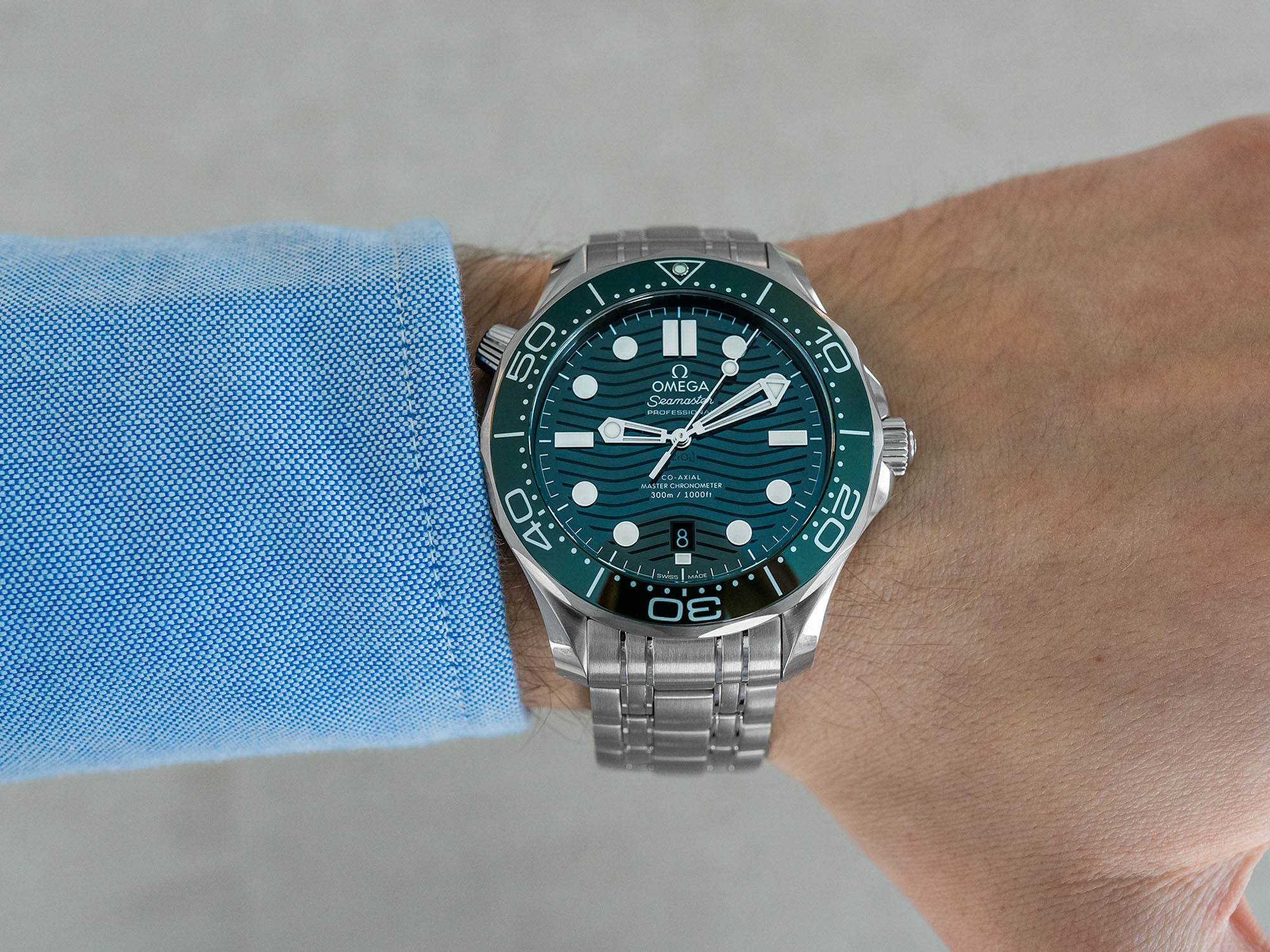
BOND’S DIVE WATCH GOES GREEN: SEAMASTER DIVER 300M
The Seamaster Diver, a descendant of the original, dressy Seamaster from 1948 and its classically sporty offspring, the Seamaster Professional, in 1957, hit the market in 1993. Two years later, the robustly designed model with its distinctive wave-pattern dial found its way to the wrist of its most famous wearer, namely big-screen superspy James Bond.
Largely because of its association with Agent 007, the Omega Seamaster Diver 300M has become a popular collection in its own right, separate from both the main Seamaster Professional line and the Seamaster Aqua Terra collection of nautically inspired dress watches, and is regarded as possibly Omega’s most “serious” watch for actual diving. The newest version doesn’t disappoint in that regard, with its 42-mm steel case, water-resistant to 300 meters; a unidirectional ratcheting divers’ bezel with an engraved green-and-white ceramic dive scale, and a patented helium release valve among its utilitarian attributes. It’s also a timepiece quite striking in its livery, with the familiar, laser-engraved wave pattern dial executed here in a rich green to match the bezel. The hands and hour markers are as ultra-legible as fans of the Seamaster 300M have come to expect, rhodium-coated and treated with white Super-LumiNova.
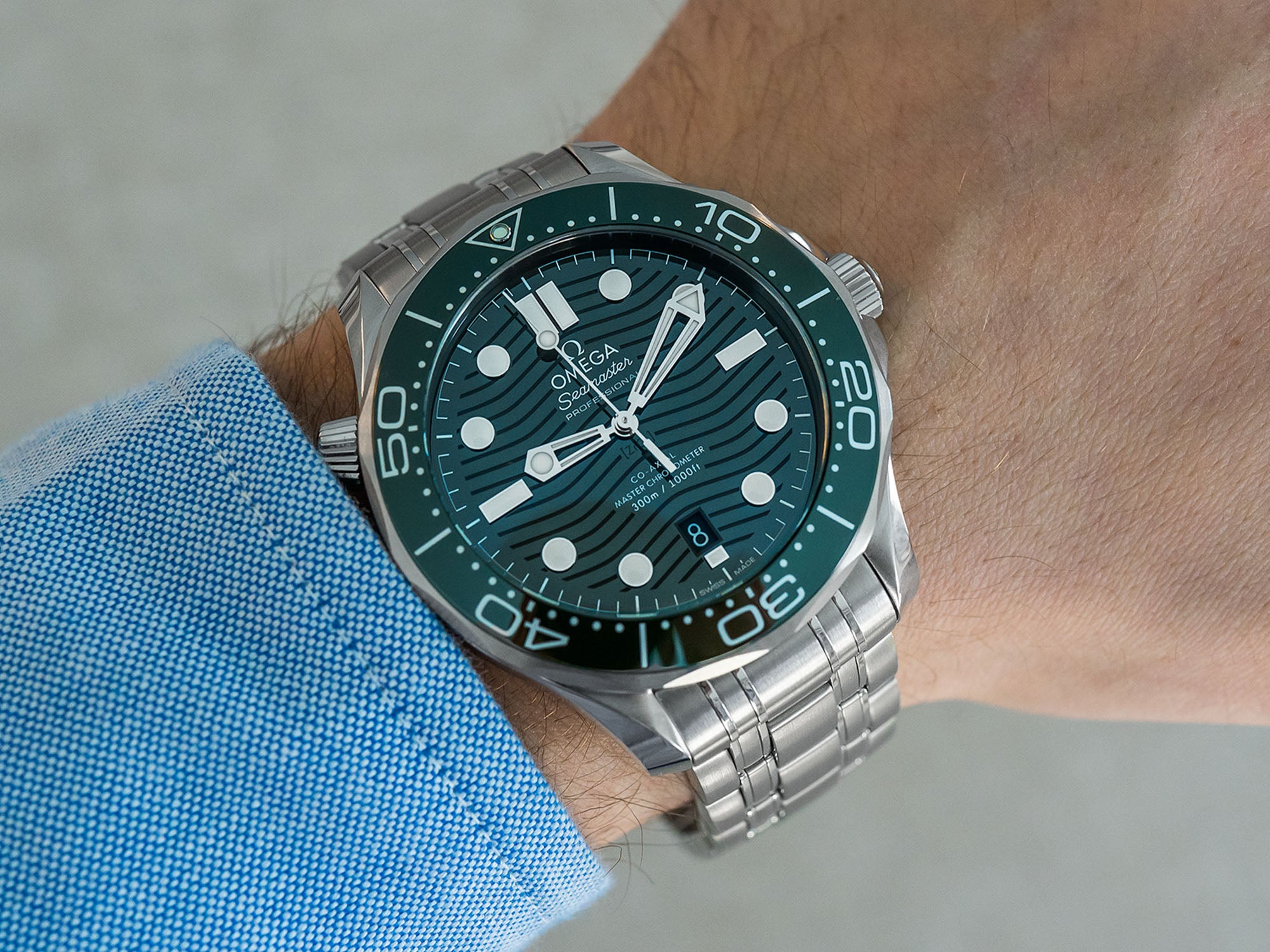
Also expected at this juncture, though never to be unappreciated or taken for granted, is the movement that beats inside the case, behind a solid polished-and-brushed wave-pattern-adorned caseback with a sapphire window. Omega’s co-axial Master Chronometer Caliber 8800, a mainstay of the Seamaster 300 and other models across Omega’s collection, features automatic winding, a 25,200-vph frequency, a 55-hour power reserve, and the host of technical specs that make it a Master Chronometer, as per the Swiss Institute of Metrology, or METAS: among them are the industry-leading 15,000 Gauss magnetic resistance that is at least partially owed to the use of a silicon balance spring. All its mechanical talking points aside, Caliber 8800 is just as noteworthy for its high-horology decorations, including those aforementioned Geneva waves in Arabesque on the bridges. The watch is mounted on the familiar and very sharp-looking Seamaster 300M bracelet, with brushed and polished finishes and Omega’s patented foldover clasp. Price: $5,100 on the strap, $5,400 on the bracelet.
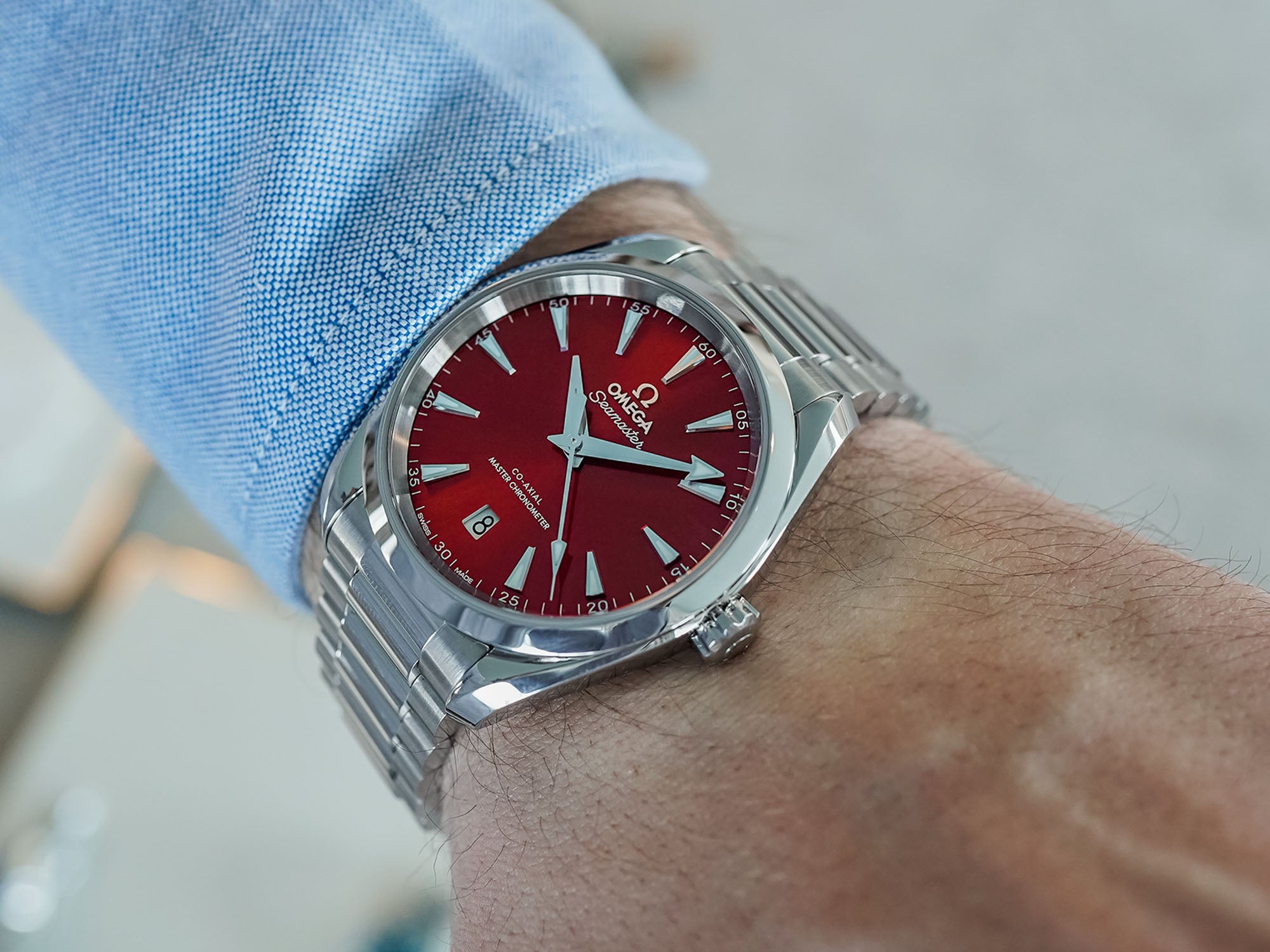
NEW WAVES OF COLOR: SEAMASTER AQUA TERRA
Occupying the more genteel environs of the expansive Seamaster collection is the nautically inspired Aqua Terra subfamily, which you probably would not want to wear on a deepsea dive but would be right at home on a pleasure cruise or a beach party. Five new Aqua Terra models in 38-mm cases and five in 34-mm cases, all in polished stainless steel and mounted on bracelets, debuted at Omega Days, all with dials that eschew the customary teakwood textured look in favor a sunburst finish in a variety of dazzling new colors.
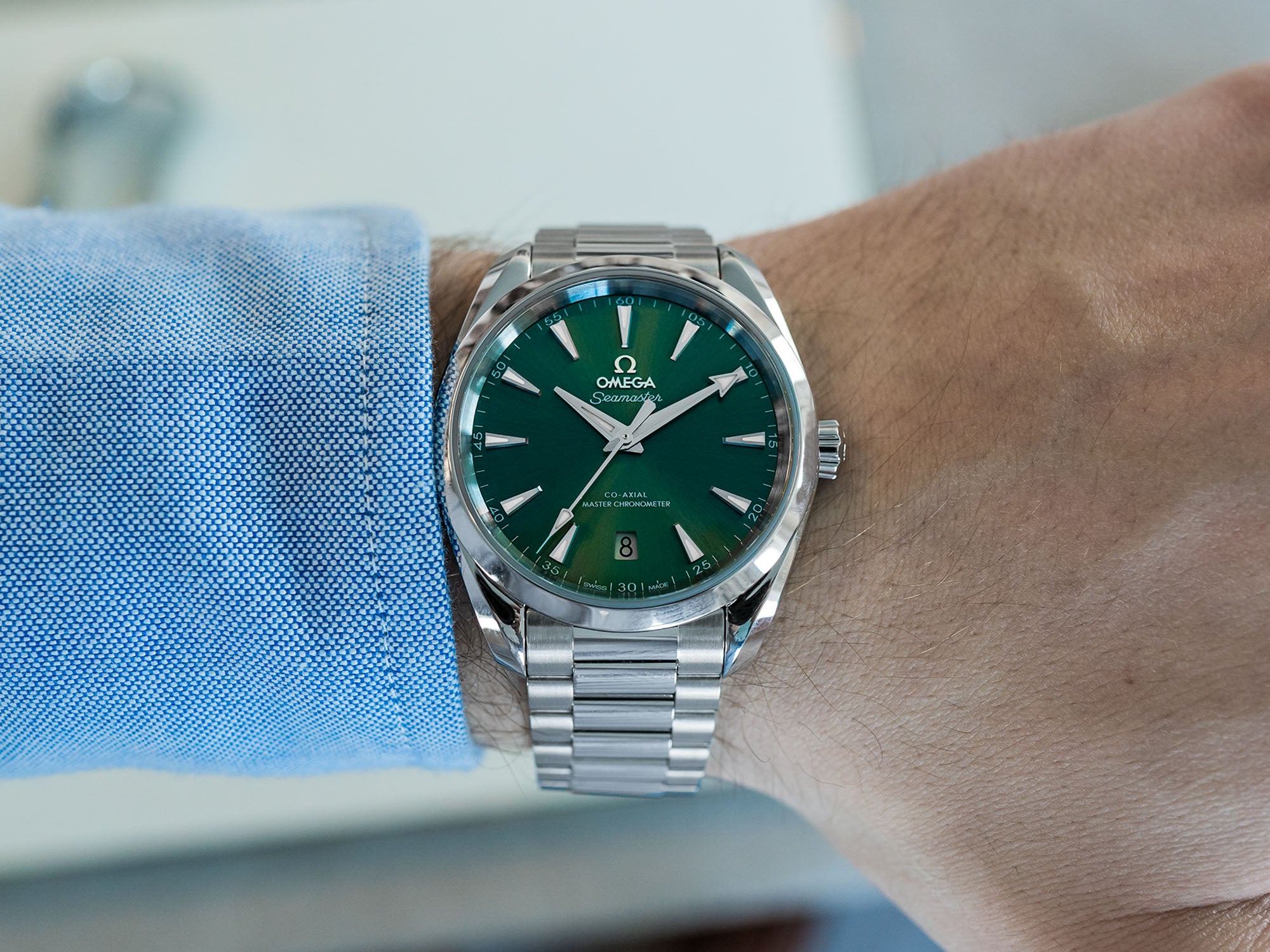
The colors chosen – which Omega says represent the transition from “Aqua” (sea) to “Terra” (land) — are Atlantic Blue, Bay Green, Sandston, Saffron, and Terracotta in the 38-mm cases and Sea Blue, Lagoon Green, Sandstone, Shell Pink, and Lavender in the 34-mm cases. The dials’ hues are achieved in a PVD process, except for the Terracotta, which is the result of a similar technique called CVD (chemical vapor deposition). The hands are rhodium-plated on the larger models and made of 18k white gold on the smaller ones. Inside each polished case is Omega’s ubiquitous, self-winding Caliber 8800, which powers the simple three-hand time display and the date at 6 o’clock and stores a power reserve of 55 hours. Prices start at $5,700.
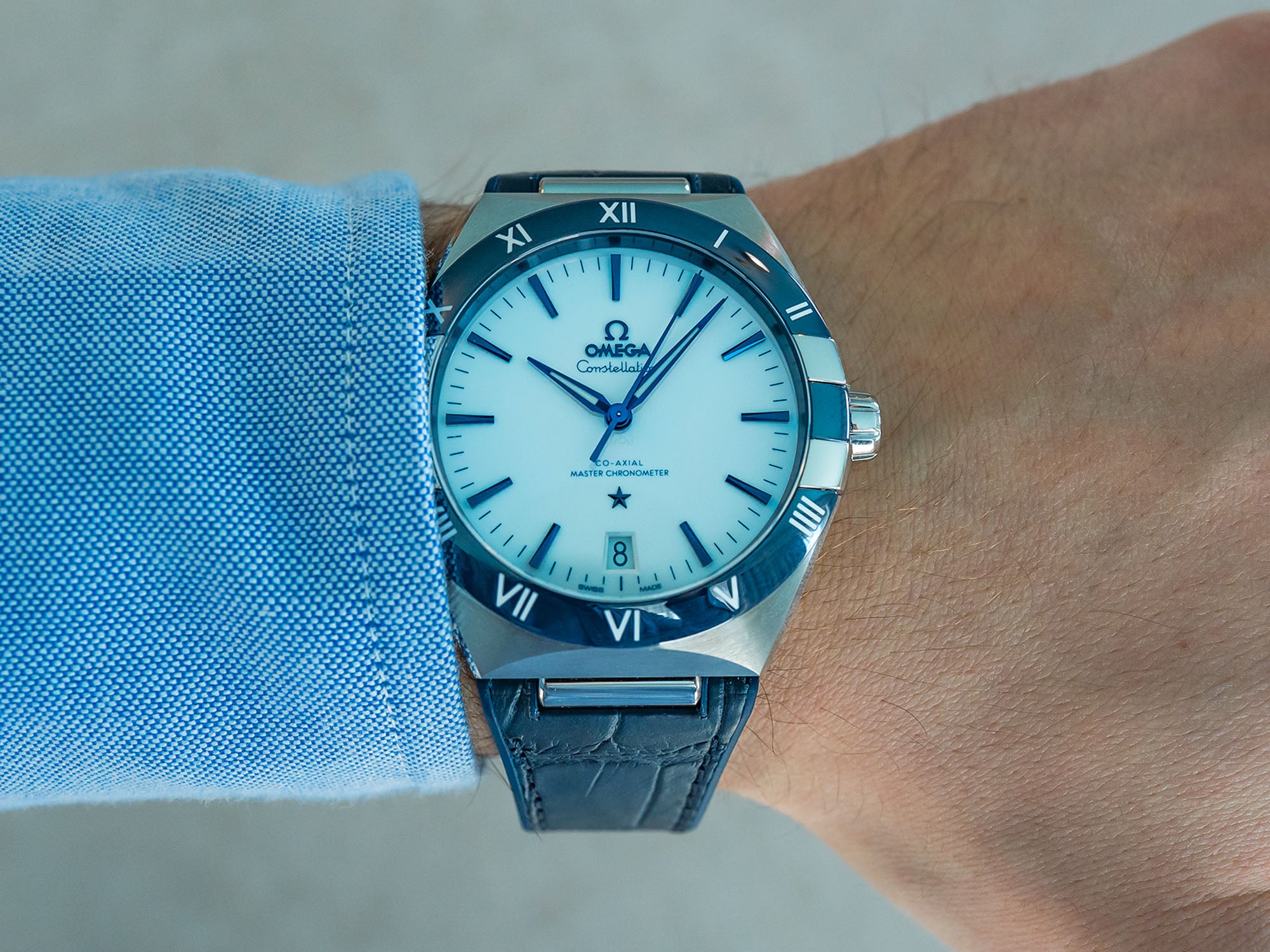
COLORS AND CLAWS: THE CONSTELLATION COLLECTION
The Omega Constellation traces its history all the way back to 1952 and received a refresh a few years ago. Omega is launching a slew of new Constellation watches this year in a range of sizes, case materials and colorways. The 41-mm Gent models are in stainless steel, steel and yellow gold, and steel and Omega-proprietary Sedna Gold. All the watches feature colorful, polished ceramic bezels in blue, black, or brown, and the hallmark Roman-numeral-bedecked bezels with side-mounted “claws,” a design element that hearkens back to the Constellation’s most enduring revamp in 1982. The watches are equipped with the automatic Master Chronometer Caliber 8900 and mounted on leather straps with rubber lining in colors that echo the dials and bezels. More feminine and sized at 29 mm are the Constellation Aventurine models, 12 references in all, with aventurine dials in red, green, or blue and bezels that are either set with diamonds or engraved with the familiar Roman numeral hour markers. The watches offer steel or Sedna gold cases, containing either the automatic Caliber 8700 or the 8701 (the latter with a gold rotor to match the gold cases) and come on colorful leather straps. Coming in just slightly smaller in diameter, the 28 new Constellation 28mm models expand the color palette substantially, with dials including Blush Rose, Celestial Blue, Patchouli Blossom (violet), and Matcha Green, with those dial colors also adding a subtle pop of color to the engraved Roman numerals on the bezels. The casebacks are all adorned with a stamped medallion of the observatory where Omega won its prizes for timekeeping precision in the 1930s and ‘40s; behind them are Swiss quartz calibers with a 48-month battery life. Prices range from $6,500 to $8,700.
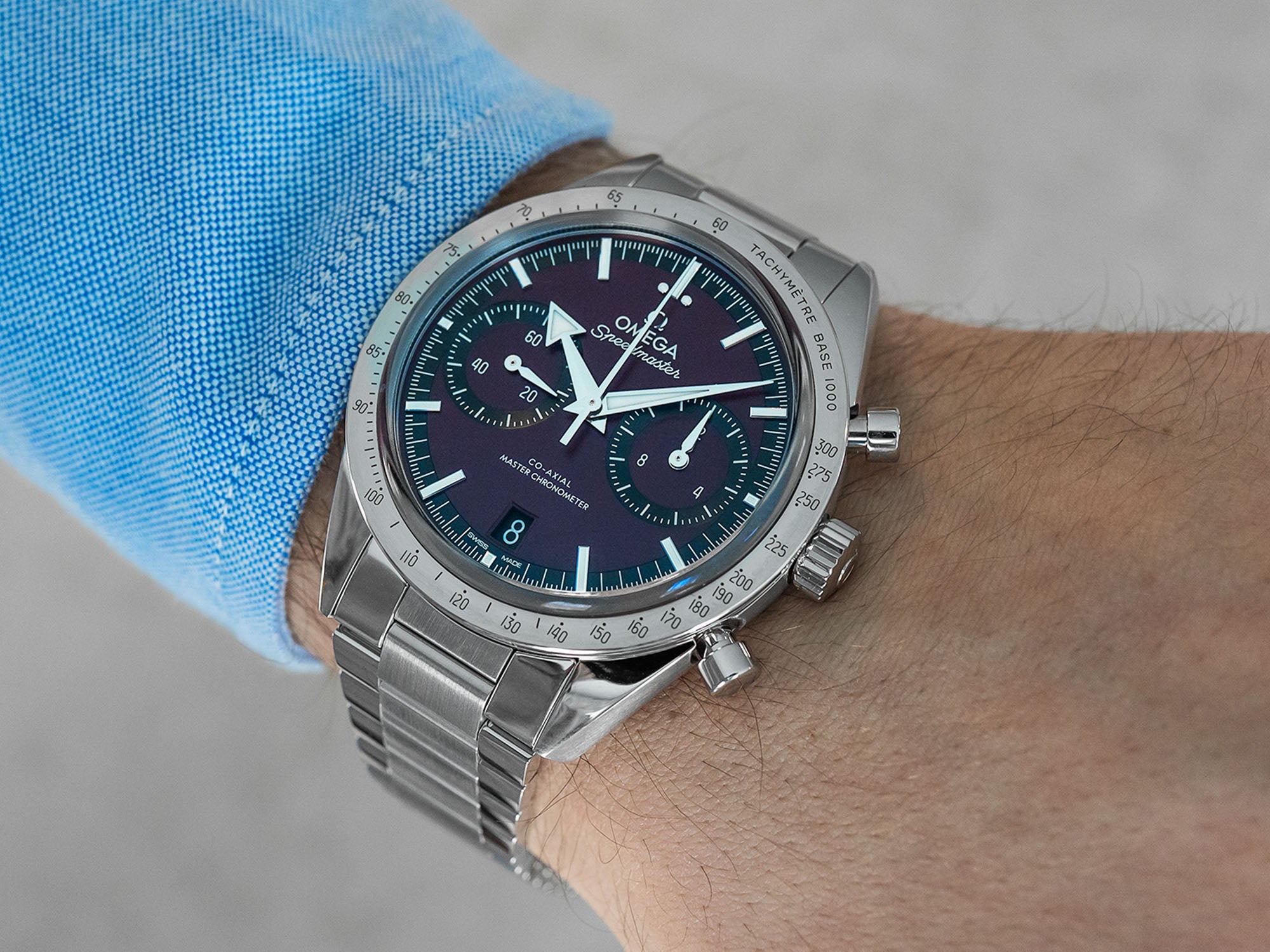
SPEEDMASTER ‘57 CALIBER 9906: MANUALLY WOUND, MOTORSPORT INSPIRED
It wouldn’t be a legitimate Omega product year without at least one interesting new iteration of its most iconic timepieces, the Speedmaster Professional, aka the Moonwatch, and Omega doesn’t disappoint here, offering two distinctively different and very noteworthy models. One is the latest take on the retro-flavored Speedmaster ‘57, which Omega first rolled out in 2013 in tribute to the original Speedy first unveiled in (you guessed it) 1957, alongside the first modern Seamaster and the recently revived Railmaster. Before it became legendary as the first watch worn on the moon, the Speedmaster, as per its name, was targeted as a chronograph for auto racing, and the design of the ‘57 model recalls the original’s streamlined, bicompax look, broad arrow hands, tachymeter bezel with blackened scale, and two subdials at 3 and 9 o’clock, for chronograph readout and running seconds, respectively. The former subdial has an unusual two-handed design that allows both the elapsed minutes and hours tallied by the stopwatch to be read simultaneously and intuitively.
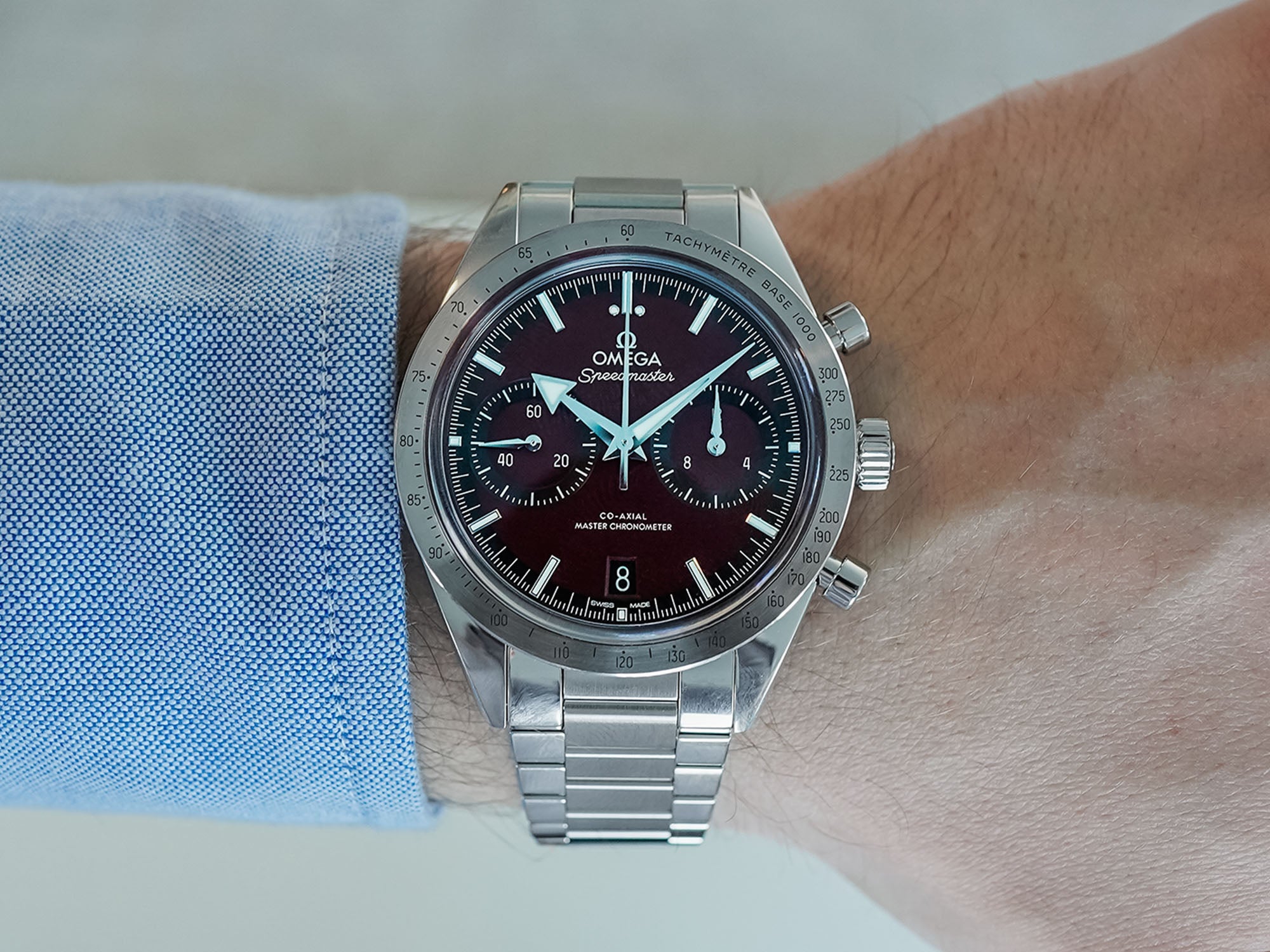
Most notable about the eight new models in the Speedmaster ‘57 series, all of them with stainless steel cases measuring 40.5 mm in diameter, are the variety of vibrant dial colorways and the watches' use, for the first time in the series, of a manually wound manufacture movement, Omega’s Co-Axial Master Chronometer Caliber 9906. The dial options include a sandwich-style version in black, with recessed hour markers and vintage-look Super-LumiNova, as well as a blue, green, and all-new varnished burgundy, all executed in PVD. The use of the manually wound caliber allows the case thickness of the latest Speedmaster ‘57 models to be considerably thinner than their self-winding predecessors, just 12.9 mm thick. (It’s also a smidgen thinner than the Speedmaster Professional 3861 Moonwatch, which is 13.68 mm thick.) This is, of course, an additional perk considering that the new movement also bestows Master Chronometer status on the Speedmaster ‘57 model for the first time, with all of the accuracy, robustness, and industry-leading magnetic resistance that designation implies.
All the Speedmaster ‘57 watches are available on either steel bracelets (in the style that Omega introduced for the Apollo 11 Tribute Edition Moonwatch in 2019) or dial-matching colored leather straps. The new movement, visible behind a sapphire caseback, has an antimagnetic silicon balance spring, a column-wheel-driven integrated chronograph function, and a 60-hour power reserve coiled up in two barrels. Price: $8,300 on straps, $8,600 on bracelets.
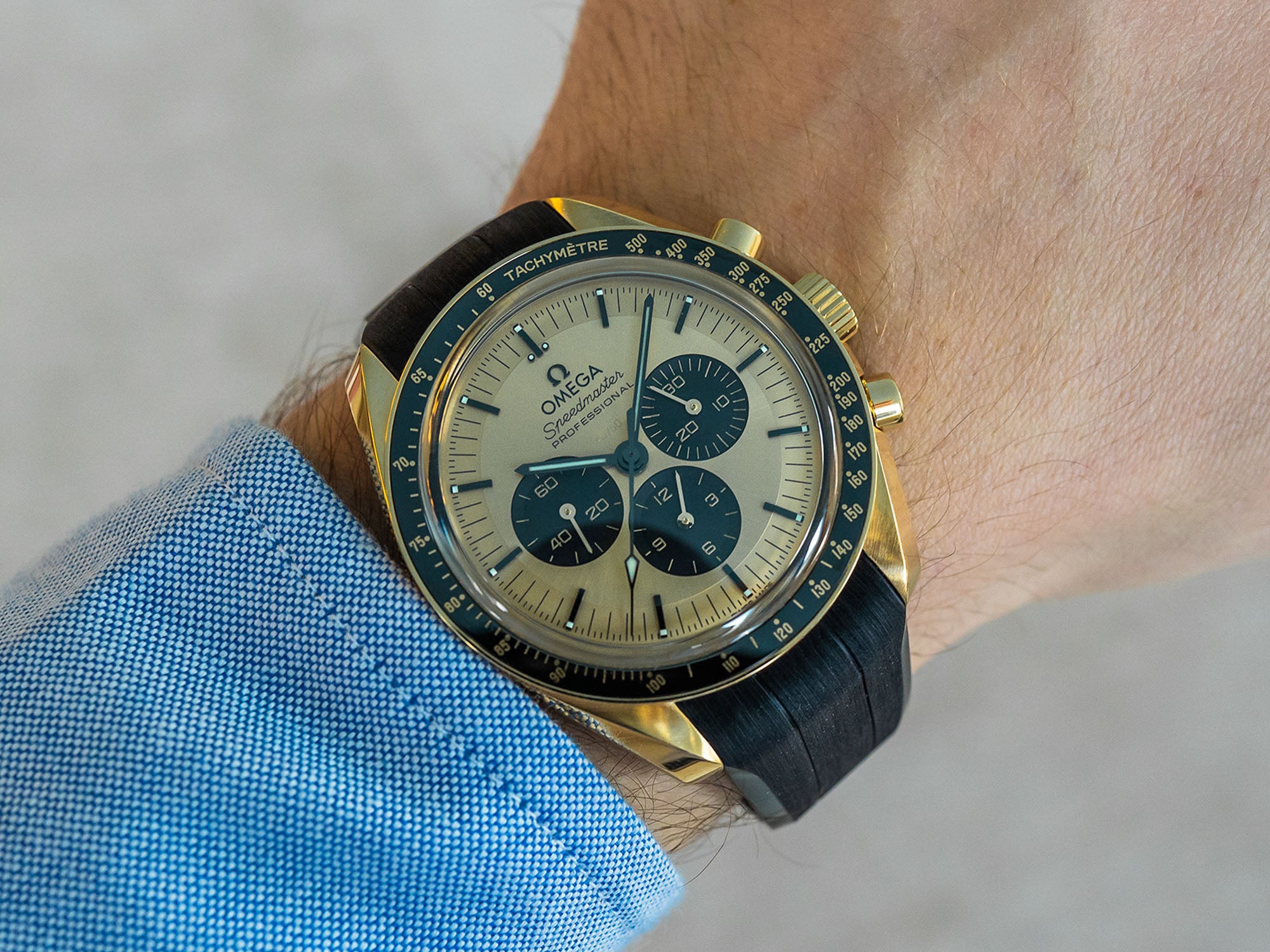
LUNAR LUXURY: SPEEDMASTER MOONWATCH IN MOONSHINE GOLD
Omega celebrated the 50th anniversary of the Apollo 11 moon landing in suitably grand style in 2019. Among the many notable Speedmaster editions launched (pun definitely intended) that year was a re-creation of the rare Ref. BA145.022, a limited edition made in 1969 specially for astronauts and space program VIPs; the modern watch was cased in a new precious metal dubbed Moonshine Gold. Omega has now used this proprietary alloy, composed of yellow gold, silver and palladium, for the case of two new Speedmaster Professional “Moonwatch” editions — one with a dial in the same gold, with black ceramic bezel ring, blackened subdials and indexes, the other with a green PVD dial and a matching green ceramic tachymeter bezel. Both offer a very fresh and avant-garde take on the classical Speedy, one of the world’s most recognized (and recognizable) sport-luxury timepieces. Moonshine gold, which is paler in hue than standard 18k yellow gold and also boasts a higher resistance to its color fading over time, is also used for the bracelet of the green-liveried model, with its patented comfort-released adjustment system and array of brushed and polished finishes. The “gold panda” model is mounted on an integrated black rubber strap with a relief lunar-surface pattern on its inner side, a cool visual and tactile bonus for fans of the Moonwatch and its history. Purists will also appreciate the movement inside, Omega’s Caliber 3861, which is still manually wound — like the one that ticked on the moon back in the summer of '69 — but has also been enhanced for contemporary audiences with technical bells and whistles like a co-axial escapement and a silicon balance spring. Its 50-hour power reserve is enough to get you through the weekend without winding, and its METAS-certified 15,000 gauss antimagnetic resistance is out of this world. Prices: $26,400 on rubber strap, $36,500 on gold bracelet.
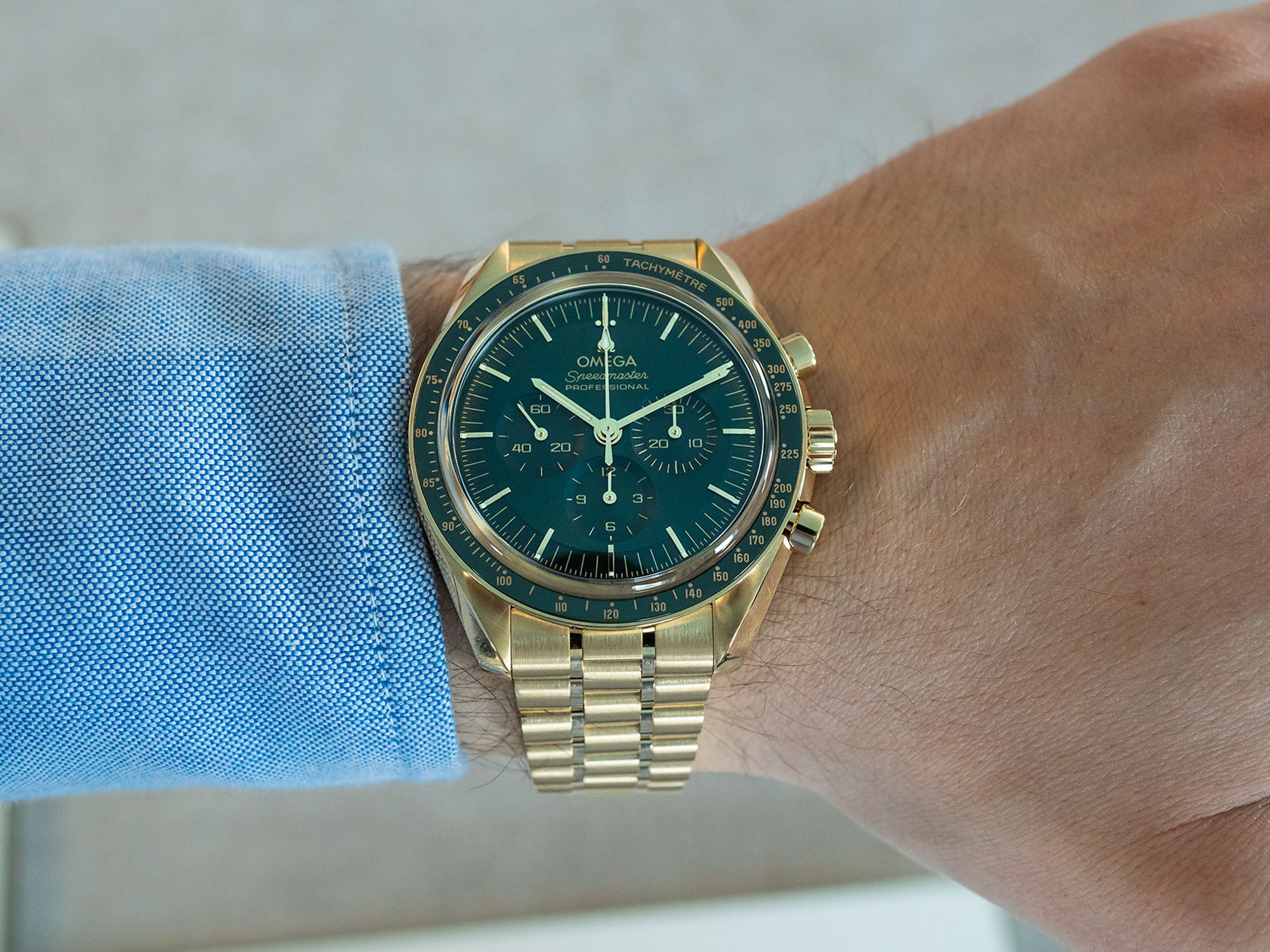
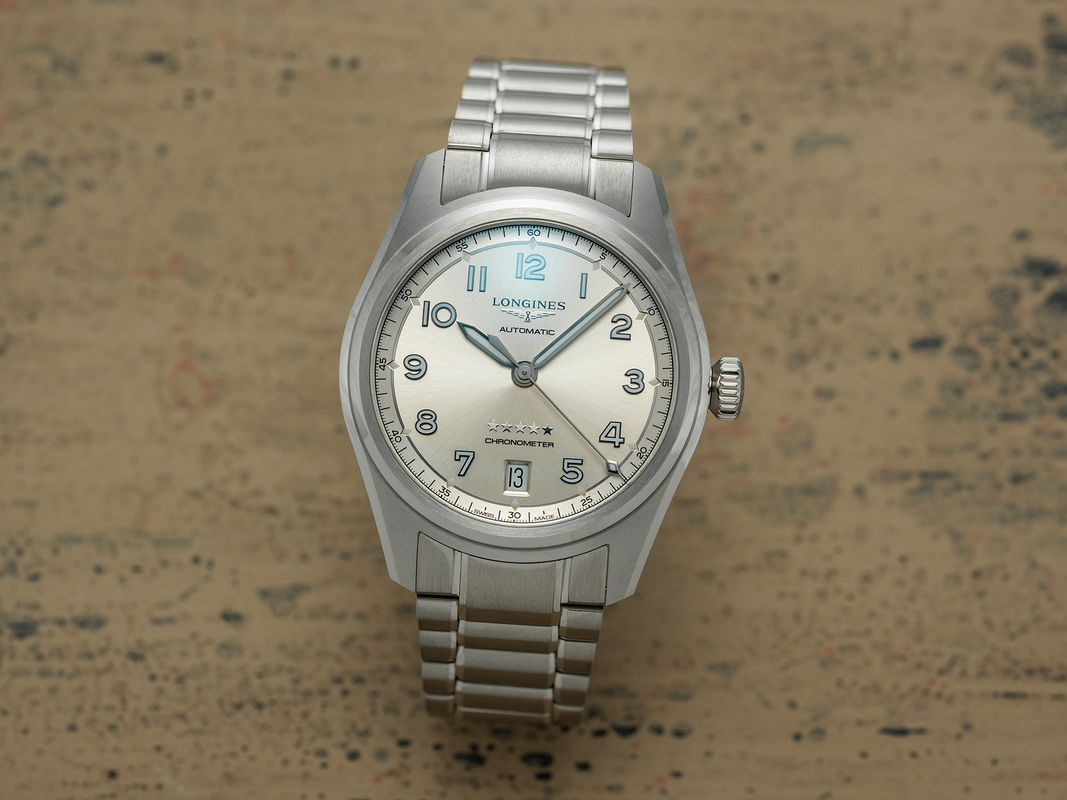

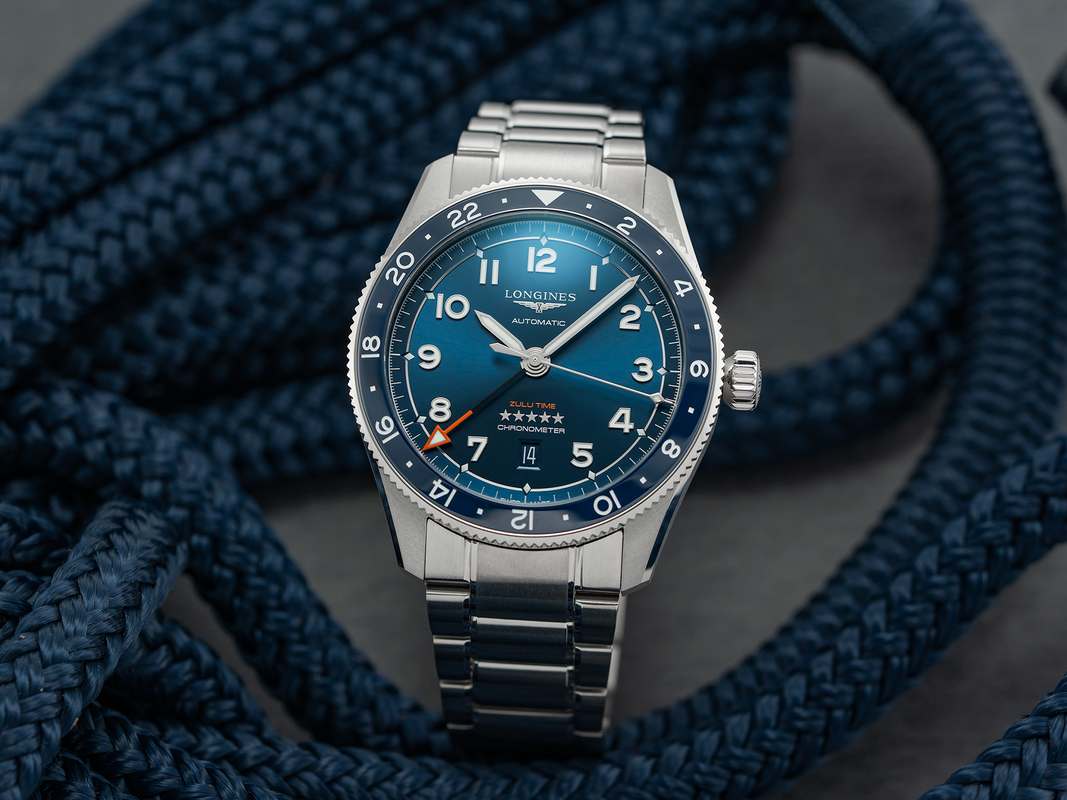
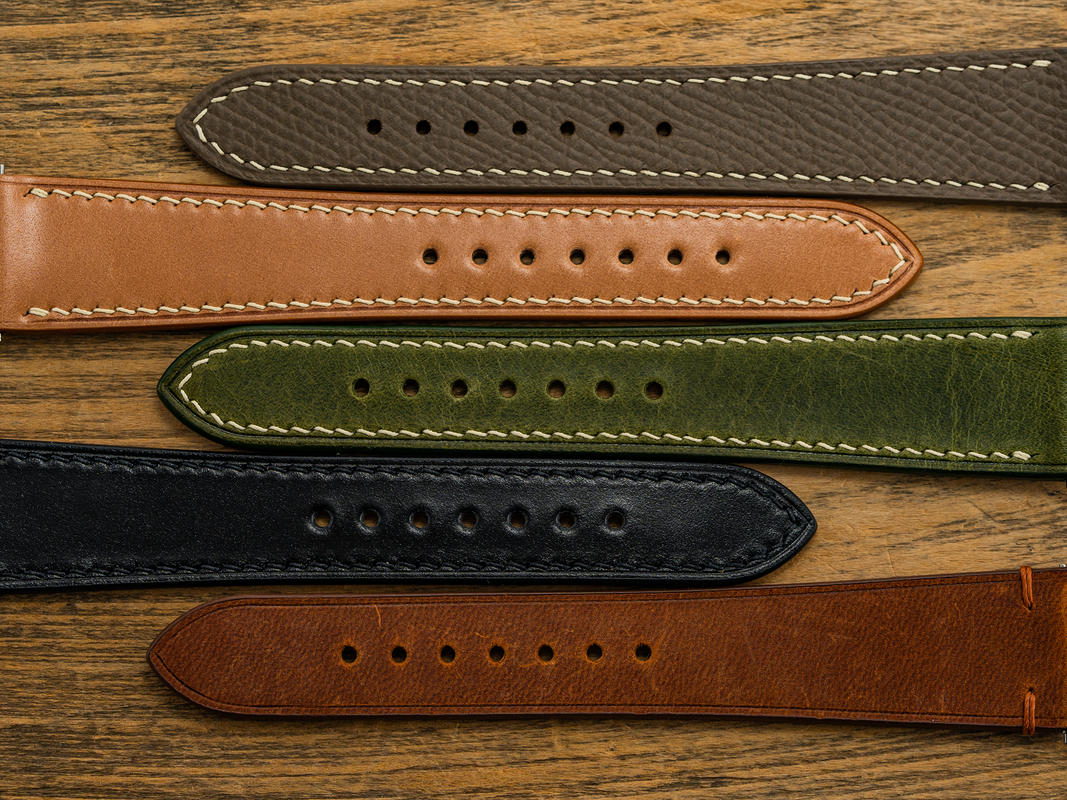
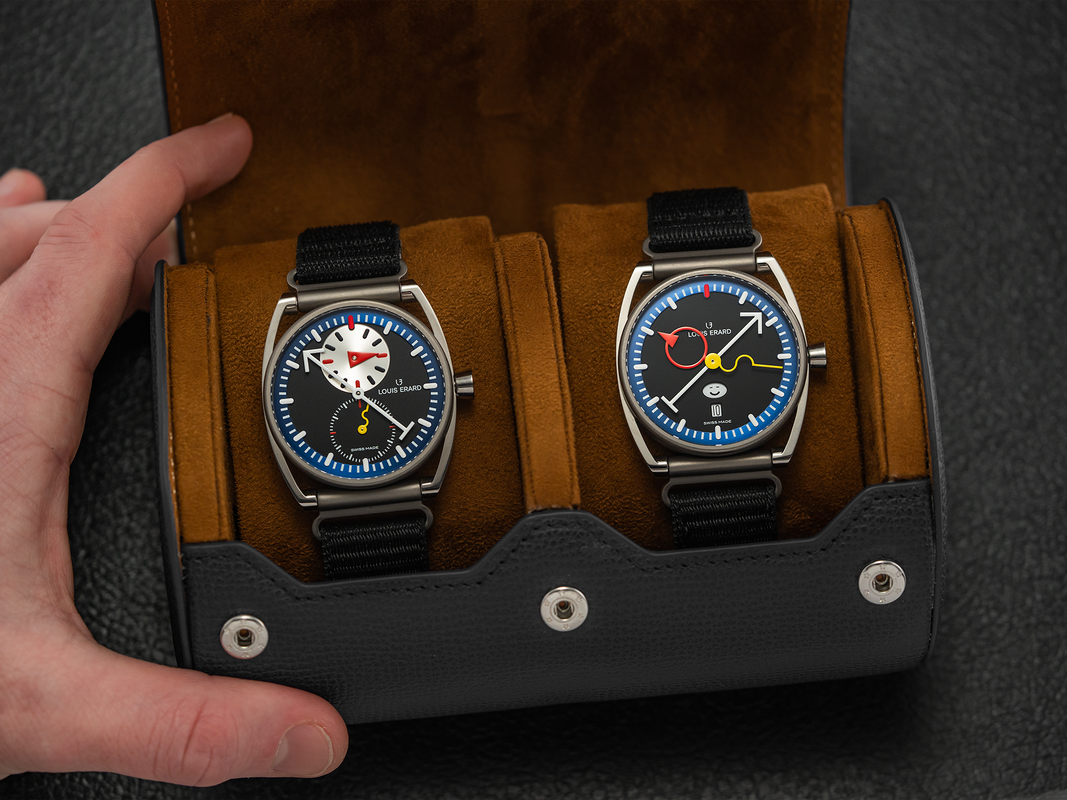
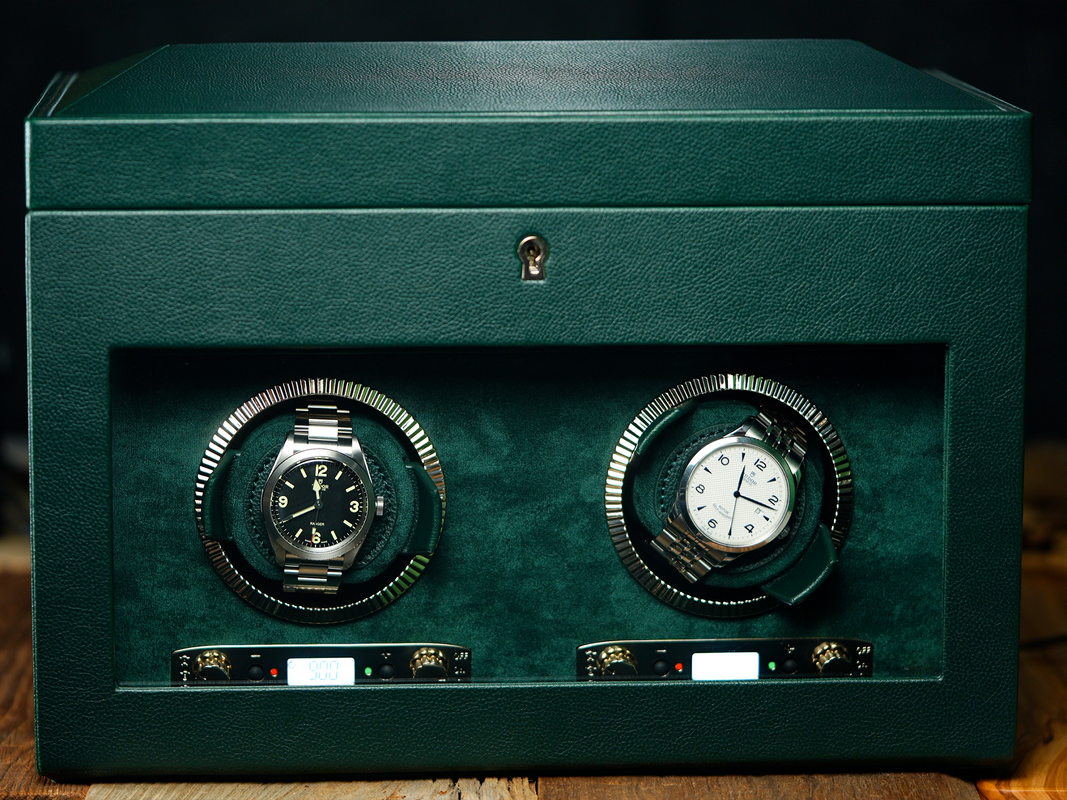
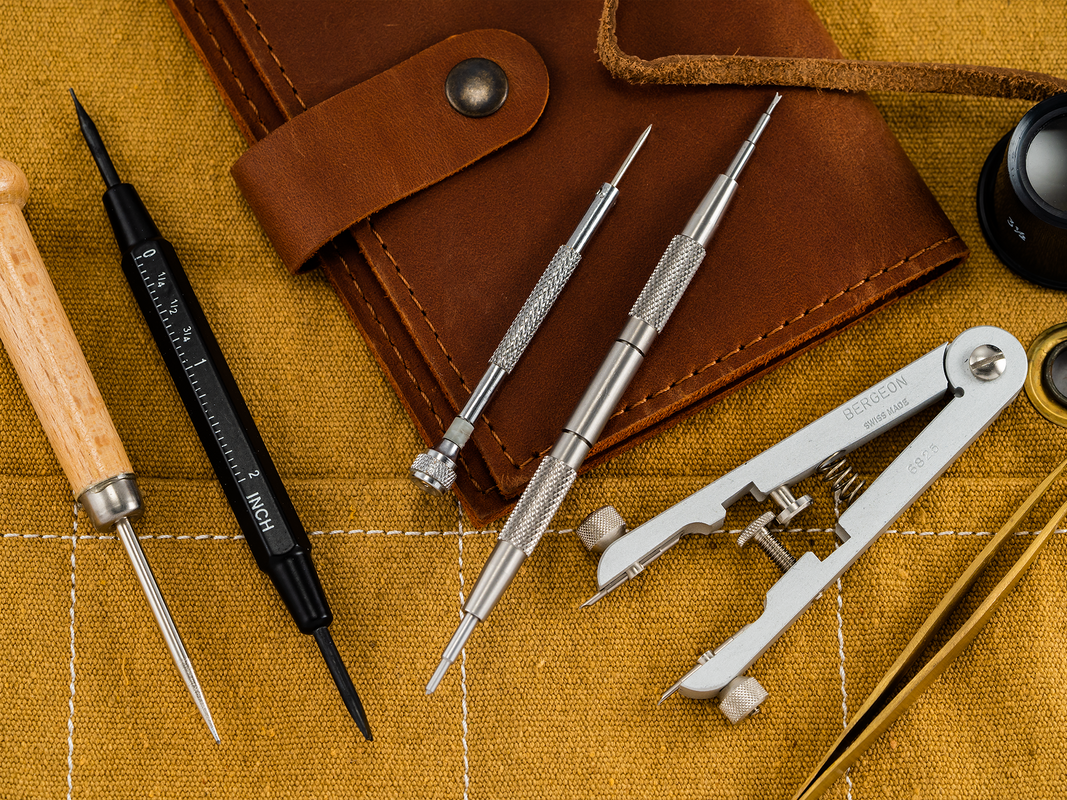




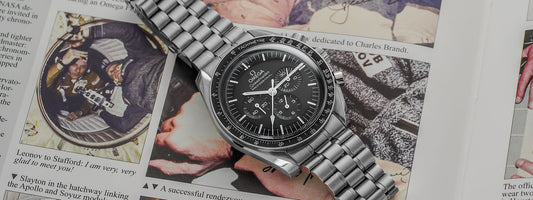
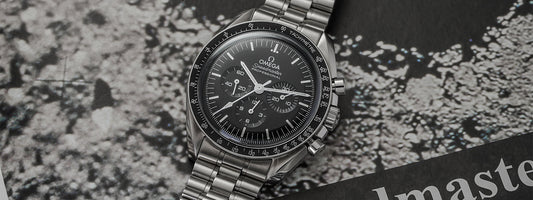
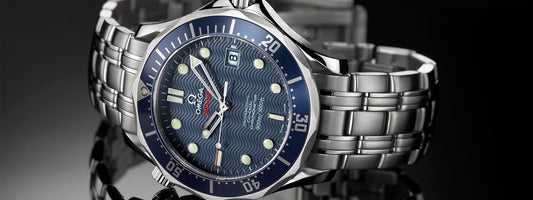
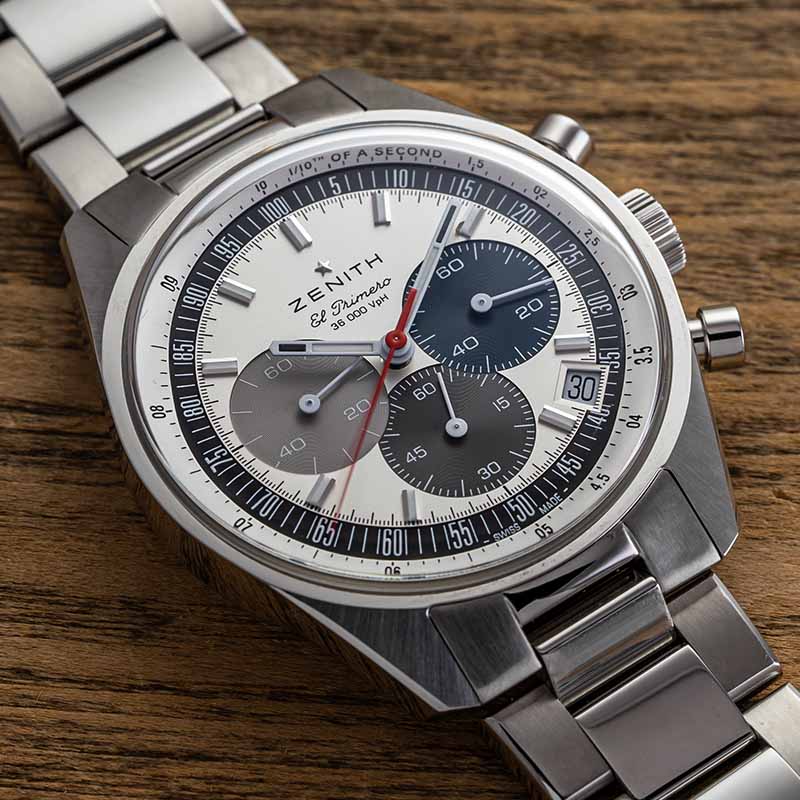


Start the Conversation